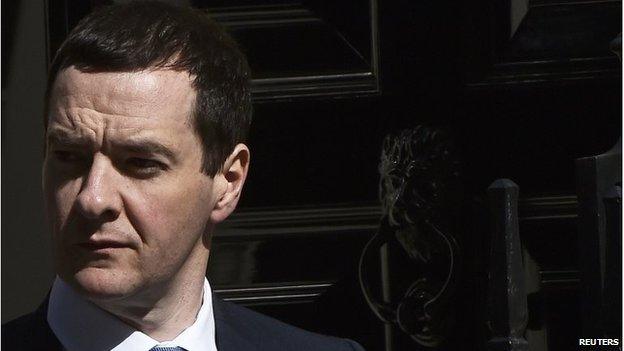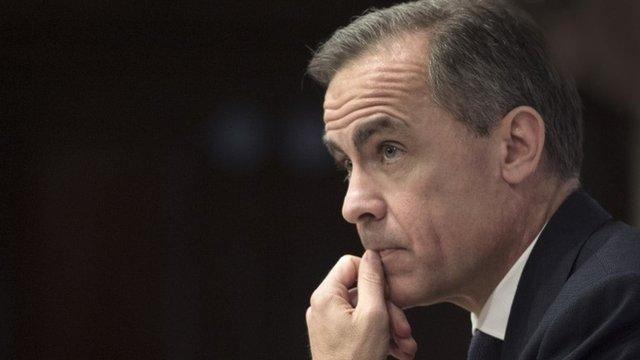Carney seeks tougher sentences for 'irresponsible' traders
- Published
Mark Carney calls for a better balance between individual and firm accountability
Bank of England governor Mark Carney has called for longer prison sentences for bankers who break the law, in a speech attacking on ethics in the City.
In his Mansion House speech Mr Carney said individuals acted with a "culture of impunity".
But, he warned: "The age of irresponsibility is over."
Meanwhile, Chancellor George Osborne said he plans to bind future governments to maintaining a budget surplus when the economy is growing.
Mr Osborne gave the Mansion House audience more details of the proposal he first announced in January.
Mr Carney said markets responsible for trillions of pounds of global trade were stained by excess, collusion and abuse and that "ethical drift" had taken hold.
"Criminal sanctions should be updated, with market abuse rules similarly extended and maximum prison terms lengthened," he added.
'Markets can go wrong'
He said the Bank of England under his predecessor, Lord King, failed in the run-up to the financial crisis because of its arcane and ambiguous rules and its inability to identify risks in the banking system. It failed to effectively control markets where abuse was rife.

Mr Osborne will say those who commit fraud will be "treated like the criminals they are"
"Though markets can be powerful drivers of prosperity, markets can go wrong," according to Mr Carney.
"Left unattended, they are prone to instability, excess and abuse.
"Personal accountability was lacking, with a culture of impunity developing.
"All these factors contributed to an ethical drift. Unethical behaviour went unchecked, proliferated and eventually became the norm," he said.
Rogue trader crackdown
Mr Osborne, who was also speaking at the Mansion House, said: "The public rightly asks: 'Why is it after so many scandals so few individuals have faced punishment in the courts?'
"Individuals who fraudulently manipulate markets and commit financial crime should be treated like the criminals they are - and they will be."
The chancellor and the governor were speaking as the Fair and Effective Markets Review was published - a report by the Bank, the Treasury and the Financial Conduct Authority on strengthening controls in financial markets.
The report recommends a crackdown on rogue traders and a new Market Standards Board that would bring the "age of irresponsibility" to an end.
The review says that criminal sanctions for market abuse should be extended to traders in markets such as foreign exchange, one of the markets hit hardest by manipulation by banks.
'Updated sanctions'
It also says that maximum sentences for wrongdoing should be lengthened from seven years to 10.
The report argues that the Senior Managers' Regime of controls already agreed for banks should be extended to more people in financial services, including traders and brokers.

"The Bank's contribution to the effectiveness of markets fell short," Mark Carney will say
If agreed, that would mean that tens of thousands of people in financial services would be covered by the regulations which can punish wrongdoing with fines.
The Bank said it would immediately agree to be covered by the regime, including the Governor himself.
'Arcane governance'
Mr Carney has reserved some of his harshest criticisms for the Bank of England itself and how it operated ahead of the financial crisis of 2007 and 2008.
"In the run up to the crisis, the Bank's contribution to the effectiveness of markets fell short," the Governor said.
"Once under pressure, the Bank could not support the banking system.
"The Bank neither identified the scale of risks in the system nor spotted gaps in the regulatory architecture.
"[And] the Bank's arcane governance blurred the Bank's accountability and, by extension, weakened the social licence of markets."
The Bank of England's governance had now been reformed and more would be done to strengthen the way it operated, according to Mr Carney.
'Theft is theft'
City of London Lord Mayor Alan Yarrow, who spoke first at the event, said "uphold[ing] professional standards" should be the guide for financial workers.
"I feel the pendulum has swung too far towards prescription. Just because it's legal, doesn't mean it's right. It is the spirit of what we believe is right which should be the principle of our regulation.
"It's like a supermarket with no security cameras - if someone takes something without paying, it is theft. Theft is theft. There is no escape. People should uphold professional standards irrespective of whether the regulators are there or not."
In a separate statement responding to the Fair and Effective Markets Review, he said: "By toughening up the rules for manipulating the fixed income, commodities and currency markets we are turning the corner and making further abuse less likely.
"The combination of tougher rules with the expectation of better conduct and more professionalism is what the markets need and people want to see."
- Published10 June 2015

- Published10 June 2015

- Published10 March 2015
